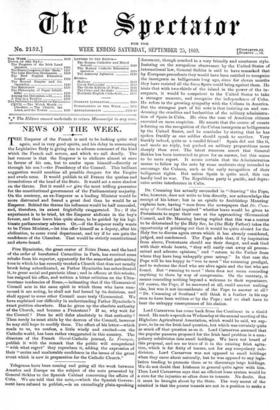Telegrams have been coming and going all the week between
America and Europe on the subject of the note presented by General Sickles to the Spanish Cabinet concerning the affairs of Cuba. We are told that the note,—which the Spanish Govern- ment have refused to publish,—is an exceedingly plain-speaking document, though couched in a very friendly and courteous style. Insisting on the scrupulous observance by the United States of international law, General Sickles is said to have remarked that by European precedents they would have been entitled to recognize the insurgents as belligerents long ago, since for eleven months they have resisted all the force Spain could bring against them. He hints that with two-thirds of the island in the power of the in- surgents, it would be competent to the United States to take a stronger measure, and recognize the independence of Cuba. He refers to the growing sympathy with the Cubans in America. But the strongest part of his note is that insisting on and con- demning the cruelties and barbarities of the military administra- tion of Spain in Cuba. He cites the case of American citizens executed on mere suspicion. He asserts that the course of events is forcing on the recognition of the Cuban insurgents as belligerents by the United States, and he concludes by stating that he has spoken frankly as one soldier should speak to another. Very frankly indeed, quite as a candid friend ! Spain did not like it, and made no reply, but pushed on military preparations more sharply than ever. The latest rumours assert that General Sickles has been instructed to press for an answer, but this seems to be mere report. It seems certain that the Administration means to follow up the note by some moderate step intended to encourage the Cubans, such as the early recognition of their belligerent rights. But unless Spain is quite mad, this can hardly lead to war. The Republican party is pacific, and depre- cates active interference in Cuba.






























